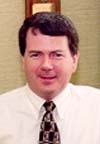by Margo Frazier, Public Relations
 On
Oct. 1, William J. Hueston, M.D.
succeeded Arthur C. Hutson Jr., M.D. as the new chairman of the Department
of Family Medicine. His first official duty was to address medical students
on the evolution and importance of primary care on National Primary Care
Day. A rural doctor himself, Hueston vocalized the need for developing
and sustaining a dual relationship, one between the health professionals
themselves and one among the health profession, patients and the community.
On
Oct. 1, William J. Hueston, M.D.
succeeded Arthur C. Hutson Jr., M.D. as the new chairman of the Department
of Family Medicine. His first official duty was to address medical students
on the evolution and importance of primary care on National Primary Care
Day. A rural doctor himself, Hueston vocalized the need for developing
and sustaining a dual relationship, one between the health professionals
themselves and one among the health profession, patients and the community.
Called a pioneer, Hueston always believed there was a need for family care. He chose medicine because “he wanted to make a difference.” He chose rural medicine because no one else was entering the field and the National Health Service Corp. awarded him a scholarship based on an agreement that he would commit four years to rural medicine in eastern Kentucky. Upon realizing the continued need for his service, Hueston stayed on for an additional three years.
His interests lie in obstetrics and respiratory health disease which can be seen in his numerous published clinical research articles. Hueston has also occupied several positions in Wisconsin and Kentucky.
His choice to come to MUSC was an easy one. He wanted to live in a small city and work at a university with a “history of providing excellent care.” “I came here to build something because the building blocks are here for a creative and dynamic program.”
His mission is simple: He wants to bring primary care to the forefront of medicine. “Primary care has been in the shadows of MUSC; I want to move it into areas where they need family doctors.”
The reason, according to Hueston, is the emphasis on specialty care. “Primary care is underrepresented at the more traditional medical schools; their curriculm neither exposes students to primary care experiences nor depict what primary care doctors really do.”
Additionally, Hueston realizes the future trend will emphasize prevention, continuous and comprehensive care, integration and team work, set budgets and very extensive research of the population’s health.
Therefore, the Department of Family Medicine began implementing measures that would better train students in primary care. The first step was to move the residency program to the Trident Regional Medical center so students could be closer to the community. He also plans to increase exposure of ambulatory care in community practice. He wants to treat South Carolina as “a primary care laboratory” by increasing the collaboration with physicians in practice, in order to, elevate the level of research.